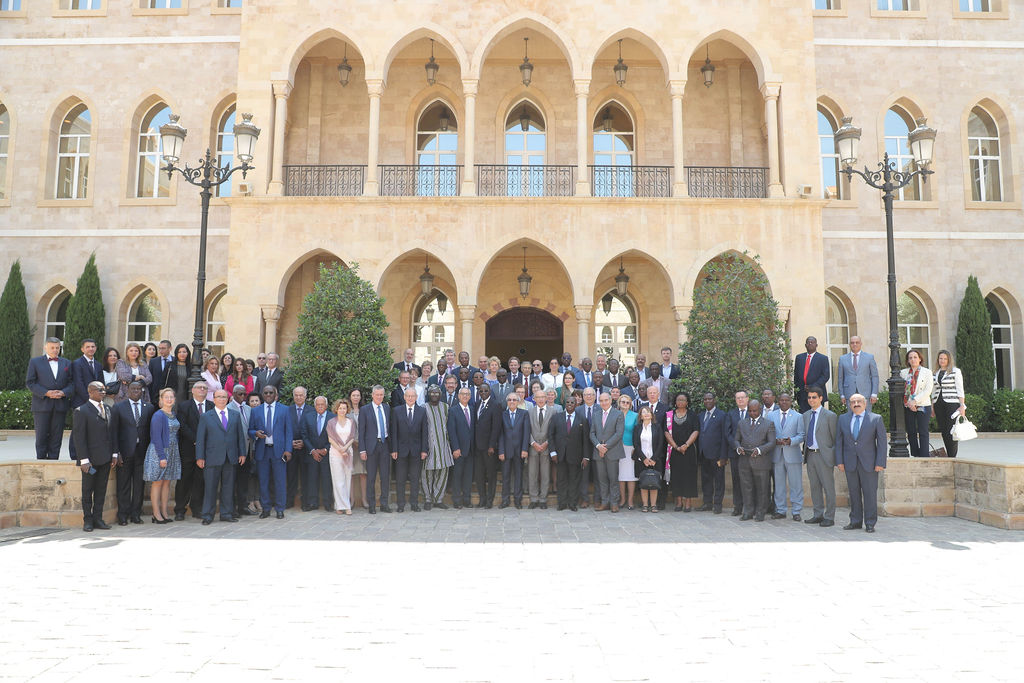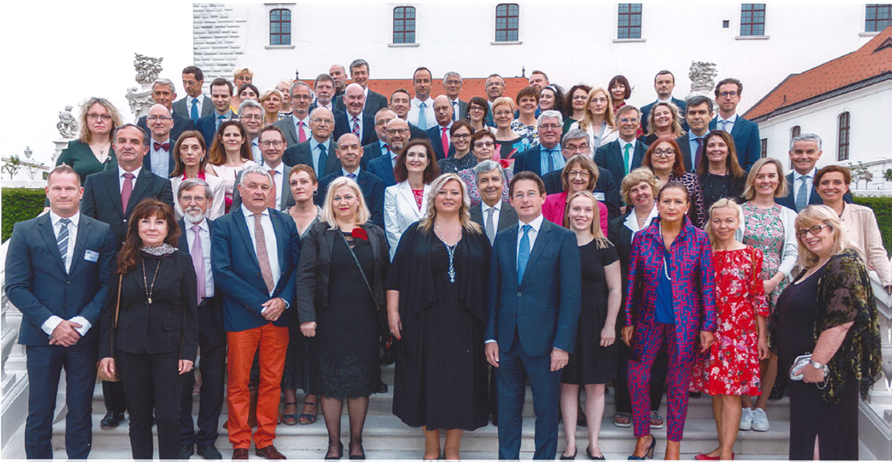The CSM pays great attention to exchanges with international institutions and Judicial Councils in other foreign States. The CSM is very keen to promote long-lasting relationships based on common issues linked to the independence of the judiciary, such as the appointment and evaluation process or judicial ethics. The Council thus hosts numerous high-level foreign delegations in order to discuss the issues at stake in constitutional reforms. It particularly invests in two networks gathering other Justice Councils: the European Councils of Justice Network (ECJN), created in 2004, and the Francophone Network of Councils of the Judiciary (RFCMJ), set up in November 2014. The common thread of the Council’s international activities is the strong belief that judicial independence has no other purpose than ensuring a trustworthy judiciary for its citizens.
The CSM takes part in the European and Francophone networks involving its counterparts and regularly hosts foreign delegations. The Council is convinced of the importance of the international dimension of its activities. Therefore, it wished to build a real European and international policy as soon as possible, based on two pillars: its contribution to dialogue between judges, in particular regarding the issue of the independence of the judiciary, and its institutional presence in Europe and the world.
Dialogue between judges, dialogue between Councils
- European courts and institutions
Europe is the main area for the development of judicial dialogue. In this regard, the Council strives to build quality relationships with the two European courts, namely the European Court of Human Rights and the Court of Justice of the European Union, both courts are playing a key role in the protection and promotion of judicial independence. To be truly effective, this European judicial dialogue should rely on well-structured discussions with political institutions: the Council of Europe on the one hand, and the European Commission, in particular the Commission’s Directorate General for Justice and Consumers, on the other. Contacts have already been established in this field.
- European Councils of Justice Network (ECJN)
The Council’s action in the European Union is naturally based on the European Councils of Justice Network (ECJN). The CSM has been an active member of the ECJN since its creation in 2004. This network, initially conceived as a place to discuss best practices between Councils of Justice, has gained a new dimension over the past several years, in response to “illiberal” political developments in some European countries. Since then, the Council has resolutely committed itself to an active approach to promote the rule of law through the defence of the independence and quality of justice.
In a Europe that is weakened by Brexit, this worrying political context will inevitably lead the CSM to play an even more active role in the ECJN.
The new CSM board hosted Mr Kees Steerk, member of the Council of Justice of the Netherlands and Chairman of the executive board of the ECJN, to discuss the support that the Council could provide for ECJN activities and the involvement that it should have in the coming years.
ECJN activities:
The goals of the ECJN’s strategic plan for 2018-2021 are developed within the framework of the working groups and projects outlined below.
The “independence, responsibility and quality of justice” working group aims to identify the obstacles that judges and prosecutors face with regard to independence, responsibility and quality of justice.
The group’s work relies on the determination of quality indicators that could serve as a guideline for Councils of Justice to improve their respective situations. Every two years, the launch of two questionnaires, one for professional judges and the other for lay judges, is at the very heart of the working group’s activity.
Given the low participation rate in previous surveys, France did not circulate the questionnaires that had been put on-line in the spring of 2019. The Council is thinking about the measures that should be implemented to support the launch of the next survey. It has accepted to pilot the distribution of a questionnaire on independence amongst its users.
The “Public confidence and image of justice” working group strives to determine a set of common values, and to prioritise the good practices that contribute to the influence of judicial activities and to the strengthening of public confidence in the judicial system. With time, the working group wishes to draw up an action plan for use by all Councils.
The “Digital Justice Forum” project aims to make the functioning of the judicial systems in ECJN member countries accessible, intelligible and transparent for all citizens.
A workshop on evaluation, in which the CSM participated in December 2019, provided an opportunity to exchange views between the Councils of Justice.
- Privileged bilateral relations
This action carried out within a multilateral framework, can be usefully supplemented and reinforced by the development of long-term bilateral relationships with chosen partners on issues considered as essential, such as the organisation and functioning of the Councils of Justice, judicial assessment or the selection of heads of court. The first steps of this bilateral policy were taken in 2012 and should be reinforced in 2020, in particular concerning Belgium and Italy.
- Francophone Network of the Councils of the Judiciary (RFCMJ)
As one of the founding members (with Quebec, Lebanon and Senegal), the Council will continue to invest in the activities of the Francophone Network of the Councils of the Judiciary (RFCMJ). In this respect, 2019 provided the opportunity to pursue the work initiated by the previous terms of office.
The symposium of the Network took place in Beirut on 14th June 2019 following events organised for the Jubilee of the Court of Cassation of Lebanon in which members of the Arab Supreme Courts and the Association of the High Courts of Francophone countries (AHJUCAF) took part. Mr François Molins, General Prosecutor at the Court of Cassation and President of the section of the Council responsible for prosecutors, opened the symposium by discussing the issue of “Justice Councils and executive power”. Mr George Bergougnous, member of the Council, participated in a round table session on the following theme: “Councils of Justice, an independence to preserve: overview of the judiciary and political power”.
The guidelines adopted by the Network’s general meeting in Beirut were specified at a meeting of the executive board, composed of the founding members and chaired by the President of the Senegalese Council of Justice, which took place in November 2019 in Paris. These guidelines should lead in particular to developing an enlargement policy through the recruitment of new members and to launching new working groups. The first should be responsible for the implementation of the Brussels resolution, adopted in November 2018 and concerning the publication of judicial decisions and ethical and deontological risks. The second should be dedicated to the creation of a training session on ethics and judicial deontology for members of the Network.
Institutional cooperation
- Welcoming foreign delegations
Maintaining close relationships with certain States will not prevent the Council from remaining faithful to the tradition of receiving guests and remaining open to all. This tradition has led the Council, and will continue to lead it, to respond favourably to the numerous requests from foreign delegations.
In this context, the Council was particularly sought after in 2019 with visits from eleven delegations and five foreign officials. As regards the latter, it is worth mentioning that three of them, three women from Mozambique, Dominican Republic and Egypt, were hosted under the invitation programme for personalities of the future (PIPIA) implemented by the Ministry of European and Foreign Affairs. This programme allows figures from the political, academic, associative or economic world to gain better knowledge of France. The discussions with the afore-mentioned ladies focused on the independence of justice and women’s access to the judiciary.
Hosting foreign delegations provides an opportunity to exchange with peers on good practices and offers the Council a chance to ensure its institutional presence worldwide by sustaining countries that are willing to develop their institutions further. In this regard, the Council hosted members from the Commission in charge of the elaboration of draft legislation affecting the status of the judiciary in Tunisia. A meeting was also organised between some members of the Moroccan Supreme Judicial Council and representatives of the department for ethical assistance and monitoring (“service d’aide et de veille déontologique”) within a support programme financed by the European Union from which the latter benefits. The aim of the Moroccan delegation was to study this unusual department set up by the CSM in June 2016.
- Tools
In order to implement such an ambitious policy, the Council intends to acquire the necessary tools. The first measure consists in reinforcing the Council’s General Secretariat in order to enable its deputy to provide its members with strengthened support in the follow-up of its international work, especially within the ECJN.
The second measure consists in strengthening the CSM’s international visibility. With this in mind, the redesigning of the Council’s website should provide an opportunity to translate its content into English and Spanish and eventually other languages. In the meantime, translations of the compendium of the Judiciary’s ethical obligations were published in January 2019 and put on-line in September of the same year. Topic sheets introducing the Council’s activities, which can be used as pedagogical support for visits by foreign delegations, will be available in several languages. A third measure will consist in improving coordination of the Council’s international actions, both within the international network in which it takes part and in cooperation with activities run by other French political and judicial institutions involved in this field.


